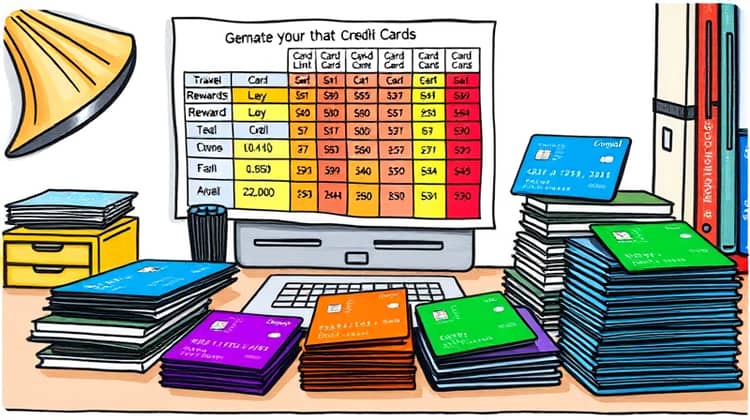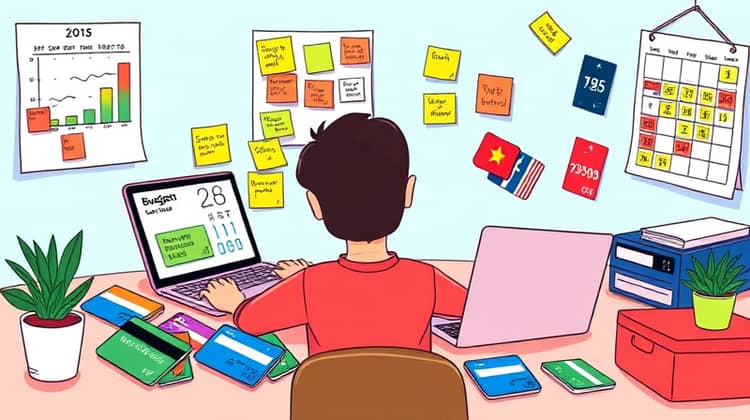Mastering Multiple Credit Cards: 5 Strategies for Effective Management

Managing multiple credit cards can often feel overwhelming, but with the right strategies, you can turn this task into a manageable routine. Many individuals own several credit cards for various reasons, including taking advantage of rewards programs, enjoying certain perks, or maximizing credit limits. However, without proper management, multiple cards can lead to excessive debt and financial stress.
In this article, we will explore five effective strategies that will help you master your multiple credit cards. Implementing these strategies can lead to better financial health, optimized use of benefits, and increased overall financial discipline. Let's dive into the details of managing your credit cards effectively.
1. Organize Your Cards

The first step to managing multiple credit cards effectively is to get organized. A systematic approach helps you know what cards you have, their limits, and any associated rewards. Create a chart or spreadsheet to keep track of all your cards in one place. This will allow you to visualize your credit situation at any time.
Consider categorizing your cards based on their use, such as travel rewards, cash back, or no foreign transaction fees. Having a clear organization will help prevent any missed payments and enable better decision-making when it comes to using the right card for the right purchase.
- List all your credit card accounts along with their balance, credit limit, and due dates.
- Categorize cards by their benefits and usage frequency.
- Establish a system for regular review and updating of information. Each card should be reviewed annually or semi-annually.
- Consider digital apps to help manage and organize your cards easily.
An organized approach not only helps you keep track of your cards but also empowers you to utilize them to their fullest potential. With a clear view of your credit landscape, you can make informed decisions and optimize your credit use.
2. Track Spending and Due Dates

Tracking your spending and payment due dates is crucial when managing multiple credit cards. Utilizing budgeting tools or apps can automate much of this process, making it easier to stick to your budget and avoid late fees. It’s also wise to create reminders for due dates, as late payments can significantly impact your credit score.
Regularly monitoring your expenditures will give you insight into how you’re utilizing each card, allowing you to adjust your spending habits if necessary. Aim to check in on your accounts weekly or bi-weekly to keep a pulse on your financial status.
- Use budgeting apps to track your expenses accurately and set up alerts for due dates.
- Establish a monthly or bi-weekly review of all credit card statements to catch unauthorized transactions and errors.
- Create a calendar dedicated to due dates for all your cards to avoid any missed payments.
Leading an organized financial life requires a commitment to regularly tracking your expenses. Not only does this habit prevent late fees, but it also promotes a proactive approach enabled by timely reminders and reviews. Keeping an eye on your spending will ensure that you never exceed your budgets or payment deadlines.
3. Understand Each Card’s Benefits

One of the key advantages of having multiple credit cards is the array of benefits they offer. Each card is designed with certain perks in mind, whether it's cashback on groceries, travel rewards, or special discounts. Understanding these benefits is essential to maximizing their potential and receiving the rewards you deserve.
Take the time to thoroughly read the terms and conditions of each of your cards, and familiarize yourself with all the ways you can benefit from their use. This understanding will allow you to make educated decisions on which card to use for specific purchases.
- Review reward points and understand how to redeem them effectively.
- Know which cards offer purchase protections, travel insurance, or extended warranties.
- Stay informed about any changes in benefits or fees associated with your cards.
By being aware of each card's specific benefits, you can strategically leverage them to gain maximum rewards. This proactive approach not only enhances your spending but can result in significant savings and benefits over time.
4. Avoid High Balances and Interest

High credit card balances and accumulating interest can quickly lead to financial troubles. Therefore, managing your card balances should be one of your top priorities. Aim to maintain your balances well below your credit limits to support a healthy credit score and avoid triggering interest on those balances.
Additionally, keeping an eye on your overall credit utilization ratio – the total balances divided by the total credit limit – will help maintain your financial health. A good rule of thumb is to keep this ratio under 30%.
- Make more than the minimum payment to decrease your overall balance faster.
- Consider setting a personal limit on how much you use your credit cards each month to avoid overspending.
- Incorporate a payment plan for any high balances to minimize interest charges.
By actively avoiding high balances and managing your payments effectively, you can minimize interest payments and maintain control over your finances. This discipline ensures that your credit cards work for you, rather than against you.
5. Regularly Review and Update Your Card Portfolio

Your financial circumstances and credit options can change over time, so it’s essential to regularly review your credit card portfolio. This review allows you to determine whether your current cards still meet your needs and if their benefits are still relevant.
At least once a year, assess the effectiveness of each card and decide if it’s time to cancel or switch providers for better deals. Keeping up-to-date can enhance your experience with credit cards overall.
- Check for new credit card offers that might provide better benefits or lower fees.
- Consider consolidating your cards if there are reward redundancies or overlapping functions.
- Evaluate your spending habits regularly to determine if you need additional cards for particular purposes.
Maintaining an updated and efficient card portfolio ensures that you are maximizing benefits and minimizing costs. Regularly reassessing your cards helps pave the way for more strategic financial moves in the future.
Conclusion

Effectively managing multiple credit cards requires consistent effort and a structured approach. From organizing your cards to maximizing their benefits and carefully monitoring your spending, each strategy plays a vital role in your overall financial health. By implementing the five strategies outlined in this article, you can take greater control of your financial landscape.
Remember that there is no one-size-fits-all when it comes to credit cards. Tailoring your strategy based on individual needs and financial goals is crucial to ensure your credit card management is not only efficient but also rewarding. Stay informed about changes in your financial situation, habits, and card options to continue making the best decisions for yourself.
In conclusion, mastering multiple credit cards transforms a potentially overwhelming task into an opportunity for financial growth. Commit to these practices, and you'll not only enjoy the benefits your credit cards can provide, but also achieve a more secure and functional approach to managing your finances.






